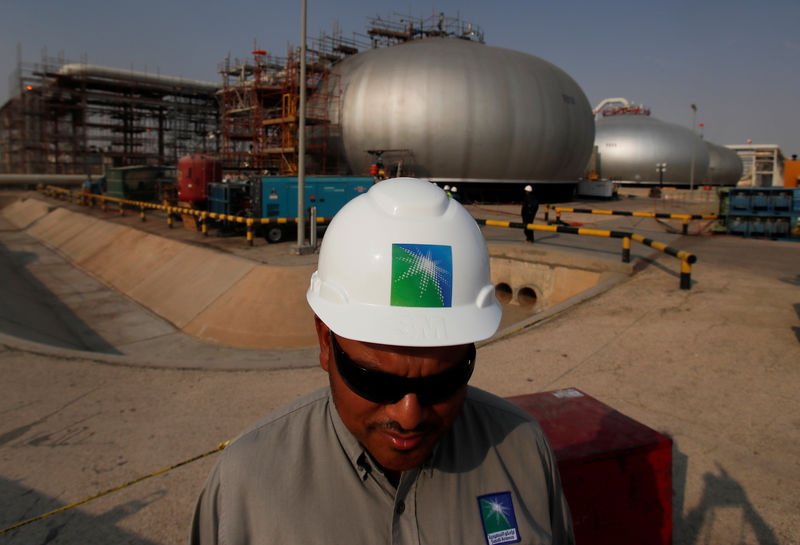By Saeed Azhar, Hadeel Al Sayegh, Rania El Gamal and Clara Denina
DUBAI/LONDON (Reuters) - After battling it out for a role in a giant IPO that promised to make history, and enduring delay after delay, investment banks advising Saudi Aramco are set to be rewarded with relatively slim pickings.
The 25 banks working on the listing will earn combined fees of $90 million or less, according to three sources involved in the deal, after the oil company scaled back its ambitions.
That fee pool is dwarfed by the $300 million paid out by Chinese retail titan Alibaba (N:BABA) for its 2014 listing in New York. It also significantly trails the estimated $176 million shelled out by Facebook (N:FB) for its 2012 IPO.
Almost four years since Saudi Arabia announced plans to list its oil champion, Aramco is finally going public, but in Riyadh rather than a global financial hub like London or New York.
The company was always expected to pay less lucrative rates than the likes of Alibaba and Facebook, given it is a state firm and the initial public offering was seen as a gateway to other lucrative deals in the kingdom. But its sheer size, and anticipation that international investors would scramble for a slice of the world's most profitable company, meant banks would have expected a far higher return.
However Saudi Arabia has pared back its own ambitions.
Riyadh originally put the state company's value at $2 trillion, but this has been revised down to a maximum of $1.7 trillion. Aramco decided on Sunday that it also would offer only 1.5% of the company - below the expected 2%.
The world's top oil exporter also canceled marketing events in developed markets like the United States and Britain, turning its back on most international investment and instead primarily targeting Saudi investors.
The banks will be paid 0.35% of the money raised, according to the three sources. This would be around $90 million if the company prices at the top of its range, raising $25.6 billion - still making it the biggest IPO in history.
If bankers had met certain milestones, including helping Aramco achieve a $2 trillion valuation and sell 2% of the company - now impossible feats - the banks would have been entitled to be paid 0.5%, the three sources said.
That meant fees could have been in excess of $200 million.
Aramco did not immediately respond to a request for comment.
Alibaba had 35 banks working on its 2014 deal, and paid fees totaling 1.2% of the $25 billion raised. Facebook, meanwhile, paid around 30 banks 1.1% of the $16 billion raised in its IPO.
FIERCE COMPETITION
The lead nine lead banks will likely get the bulk of fees. They include Citi (N:C), Goldman Sachs (N:GS), Morgan Stanley (N:MS), JPMorgan (N:JPM) as well as Saudi players National Commercial Bank (SE:1180), SAMBA Financial Group (SE:1090).
Some of the international junior bookrunners could walk away with very little as share sales to non-Saudi investors will be limited.
One of three sources said that Aramco on Sunday gave banks a 76-hour deadline to confirm whether they would stay on the deal.
Some banks are still trying to secure investment from Western funds, a fourth source said, adding it was unlikely that Aramco would ditch any banks at this advanced stage unless they asked to drop out.
One consolation could be that the listing will at least help their standing in equity capital market league tables.
Investment banks have competed fiercely for mandates from Aramco ever since Crown Prince Mohammed bin Salman in 2016 announced a plan to sell a 5% stake, including in an overseas listing, as a cornerstone of an ambitious drive to diversify the economy of the world's largest oil exporter.
Aramco said it postponed a listing in 2018 to acquire 70% of petrochemicals giant Saudi Basic Industries (SE:2010), a move seen as a bid to boost the firm's valuation.
Preparations were revived this summer after the firm attracted huge interest in its first international bond sale, seen as a pre-IPO relationship-building exercise with investors, and the company began mandating the large number of banks.
NO GLOBETROTTING
Bankers had anticipated spending much of this week globetrotting with Aramco management round meetings with investors – a presentation had been scheduled for Wednesday at London's Savoy Hotel and on Thursday at the St Regis in New York according to invitations seen by Reuters.
But all marketing events outside the Middle East region were canceled on Saturday.
"Almost all of the book will be domestic, although some QFIs may come," a fifth source said, referring to Qualified Foreign Investors allowed to invest in Saudi securities.
However foreign funds do not tend to value Saudi companies as highly as local investors, partly because they are wary of regional risks, the source said.
Such risks came to the fore when Aramco's facilities were attacked in September, initially halving oil output. Saudi Arabia blamed arch-rival Iran, which denied involvement.

Saudi banks such as National Commercial Bank, SAMBA and Al Rajhi (SE:1120) will cash in on selling the bulk of shares to locals and providing them with financing.